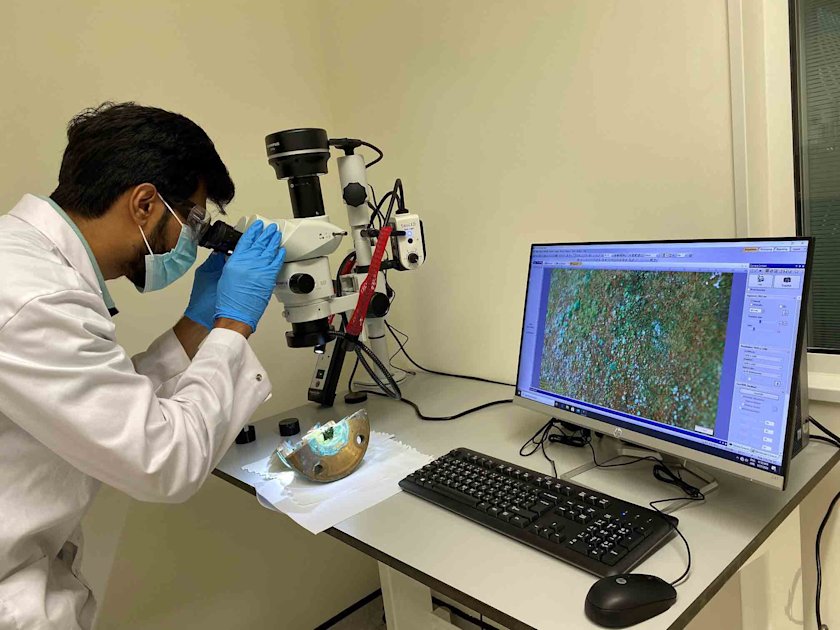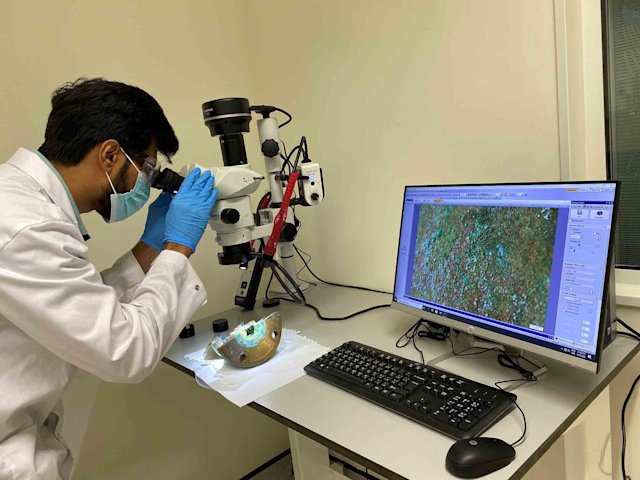Ready For What The Future Holds
Their graduation ceremonies may have been put on hold against the backdrop of COVID-19 – but the pandemic did not dim the sense of celebration at Qatar Foundation in May, as the latest wave of young change-makers to emerge from universities at Education City entered the next phase of their lives.
Over 800 graduates from Qatar Foundation’s (QF) Hamad Bin Khalifa University and its eight partner universities joined the ranks of QF alumni, as their years of study in an unique learning environment where they have honed their skills, expanded their minds, and set their course for the future came to an end.
And while their final weeks of study brought unexpected challenges with the sudden transition to online learning, the strength of character that QF’s Class of 2020 displayed – and the fact that, alongside their exams, they also passed a test of resilience - was highlighted in virtual events hosted by their universities to recognize their achievements.
Their graduation ceremonies may have been put on hold against the backdrop of COVID-19 – but the pandemic did not dim the sense of celebration at Qatar Foundation in May, as the latest wave of young change-makers to emerge from universities at Education City entered the next phase of their lives.
Over 800 graduates from Qatar Foundation’s (QF) Hamad Bin Khalifa University and its eight partner universities joined the ranks of QF alumni, as their years of study in an unique learning environment where they have honed their skills, expanded their minds, and set their course for the future came to an end.
And while their final weeks of study brought unexpected challenges with the sudden transition to online learning, the strength of character that QF’s Class of 2020 displayed – and the fact that, alongside their exams, they also passed a test of resilience - was highlighted in virtual events hosted by their universities to recognize their achievements.
Equipped to explore, excel, innovate, and make a difference, hundreds of young people who have learn and grown within QF’s ecosystem of education looked back on their achievements – and looked forward to those to come.
In 2020, 803 students graduated from universities at QF
- 505 female, 298 male
- 352 Qatari graduates
- 254 female, 98 male
QF now has 6,642 alumni
Feeding off adversity
As Dr. Ahmad M. Hasnah, Dean of HBKU, told almost 200 students who completed their final weeks at QF’s homegrown university through virtual education platforms: “I congratulate the Class of 2020 for their tremendous achievements and tenacity to complete their education despite the unique challenges of the COVID-19 containment measures.”
Among the video messages sent to graduating HBKU students was the advice of the university’s Vice President for Student Affairs, Maryam Al-Mannai, who said: “Remember the past, live in the present, and look forward to the future.”
Amir Berbić, Dean of QF partner university Virginia Commonwealth University School of the Arts in Qatar (VCUarts Qatar), spoke of how “artists and designers feed off adversity” during an online gathering to celebrate its graduating students, saying: “I count on all of you to come out of the current difficult situation, first of all healthy and strong, but also perhaps with a new perspective on the world and how you can contribute to it in meaningful ways.”
As Dr. Ahmad M. Hasnah, Dean of HBKU, told almost 200 students who completed their final weeks at QF’s homegrown university through virtual education platforms: “I congratulate the Class of 2020 for their tremendous achievements and tenacity to complete their education despite the unique challenges of the COVID-19 containment measures.”
Among the video messages sent to graduating HBKU students was the advice of the university’s Vice President for Student Affairs, Maryam Al-Mannai, who said: “Remember the past, live in the present, and look forward to the future.”
Amir Berbić, Dean of QF partner university Virginia Commonwealth University School of the Arts in Qatar (VCUarts Qatar), spoke of how “artists and designers feed off adversity” during an online gathering to celebrate its graduating students, saying: “I count on all of you to come out of the current difficult situation, first of all healthy and strong, but also perhaps with a new perspective on the world and how you can contribute to it in meaningful ways.”
Remember the past, live in the present, and look forward to the future
In 2020:
- 198 students of 44 nationalities graduated from Hamad Bin Khalifa University
- 75 students of 17 nationalities graduated from Virginia Commonwealth University School of the Arts in Qatar
In the 2019/20 academic year, QF’s higher education ecosystem had:
- 3,323 students – 2,096 female, 1,227 male
- 1,449 Qatari students – 1,078 female, 371 male
- 65 programs
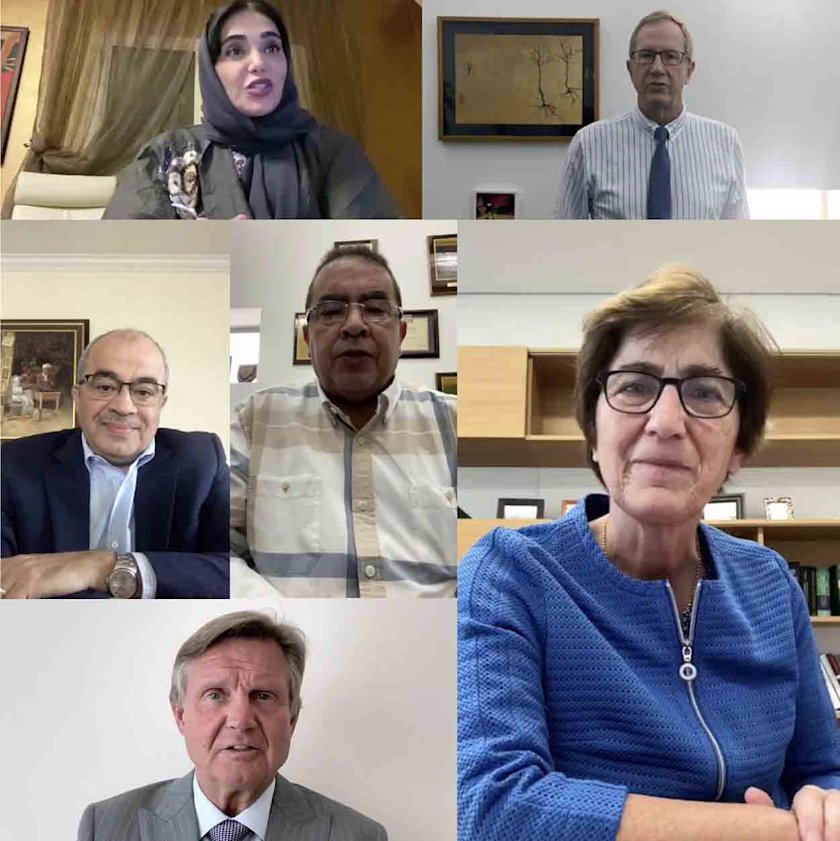
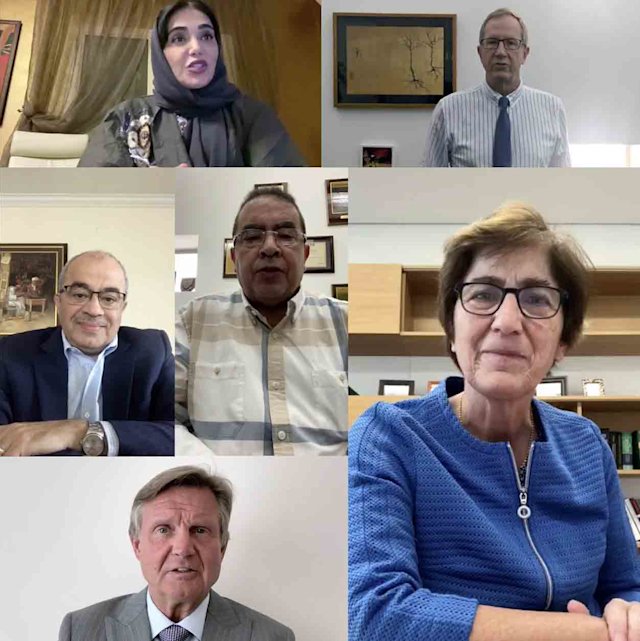
Daring to succeed
Northwestern University in Qatar’s Class of 2020 had a surprise when US TV star Stephen Colbert made a cameo appearance in the QF partner university’s congratulatory video, urging them to: “Stay strong, be brave, be daring, and have a wonderful life”.
And Michael Trick, Dean of Carnegie Mellon University in Qatar – also one of QF’s international partner universities – told a virtual event for Class of 2020 graduates: “We look at a problem as a challenge. We are creative, collaborative, practical, and optimistic.”
Amid COVID-19, the graduation of 38 new physicians – 13 of them Qatari – from QF partner university Weill Cornell Medicine-Qatar (WCM-Q) reflected the importance of cultivating a new generation of healthcare leaders. They received their degrees virtually from Dr. Javaid I. Sheikh, Dean of WCM-Q, who told them: “Recent events have underlined for all of us and for you what you already knew – that medicine makes more demands on people than almost any profession.
“But all of us answer this calling for a reason.”
Northwestern University in Qatar’s Class of 2020 had a surprise when US TV star Stephen Colbert made a cameo appearance in the QF partner university’s congratulatory video, urging them to: “Stay strong, be brave, be daring, and have a wonderful life”.
And Michael Trick, Dean of Carnegie Mellon University in Qatar – also one of QF’s international partner universities – told a virtual event for Class of 2020 graduates: “We look at a problem as a challenge. We are creative, collaborative, practical, and optimistic.”
Amid COVID-19, the graduation of 38 new physicians – 13 of them Qatari – from QF partner university Weill Cornell Medicine-Qatar (WCM-Q) reflected the importance of cultivating a new generation of healthcare leaders. They received their degrees virtually from Dr. Javaid I. Sheikh, Dean of WCM-Q, who told them: “Recent events have underlined for all of us and for you what you already knew – that medicine makes more demands on people than almost any profession.
“But all of us answer this calling for a reason.”
In 2020:
- 73 students of 16 nationalities graduated from Northwestern University in Qatar
- 86 students of 19 nationalities graduated from Carnegie Mellon University in Qatar
Medicine makes more demands on people than almost any profession. But all of us answer this calling for a reason
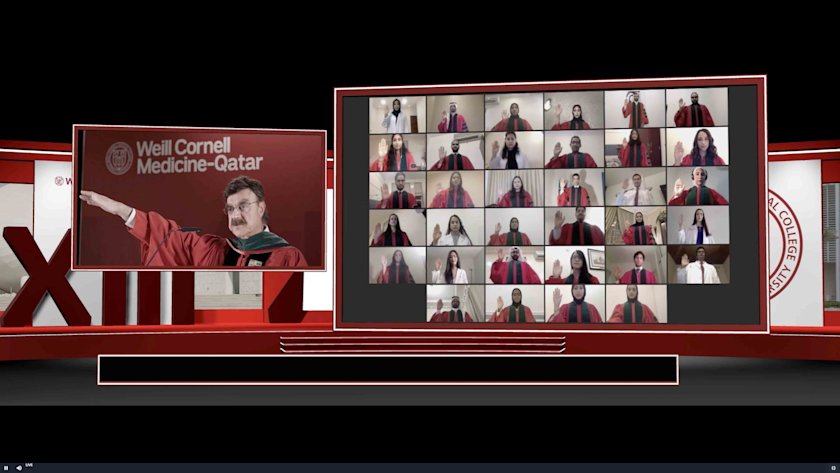
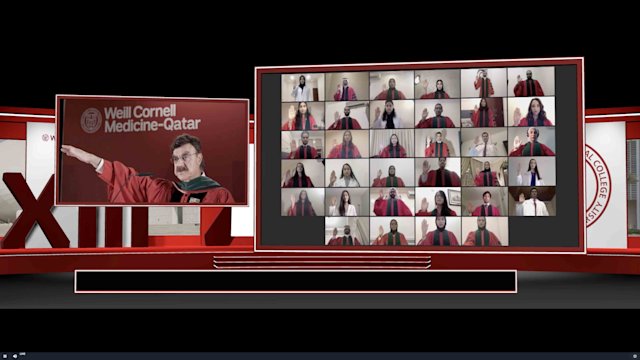
Analyzing education’s future
As graduating students looked to their future, the future of global education was placed on the global agenda at the launch of a QF-commissioned report into what higher education institutions must do to overcome challenges – and survive.
‘New schools of thought: Innovative models for delivering higher education’, published by the Economist Intelligence Unit (EIU), emphasized how decreased funding, skepticism over higher education’s value, and the automation of jobs through technology are piling new pressures on universities.
Published as universities were forced to embrace online learning and disrupt how they deliver education due to COVID-19, the report analyzed five innovative higher education models and how they are dealing with economic, social, and political challenges. Its unveiling saw an international array of education thought-leaders explore its findings and have their say on education’s future in an EIU-hosted, QF-sponsored online panel discussion.
As graduating students looked to their future, the future of global education was placed on the global agenda at the launch of a QF-commissioned report into what higher education institutions must do to overcome challenges – and survive.
‘New schools of thought: Innovative models for delivering higher education’, published by the Economist Intelligence Unit (EIU), emphasized how decreased funding, skepticism over higher education’s value, and the automation of jobs through technology are piling new pressures on universities.
Published as universities were forced to embrace online learning and disrupt how they deliver education due to COVID-19, the report analyzed five innovative higher education models and how they are dealing with economic, social, and political challenges. Its unveiling saw an international array of education thought-leaders explore its findings and have their say on education’s future in an EIU-hosted, QF-sponsored online panel discussion.
The QF-sponsored Economist Intelligence Report explores 5 higher education models:
- Online universities
- The cluster model
- Experiential institutions
- Liberal arts colleges
- The partnership model
Proving change is possible
The launch of the EIU report was preceded by a message from Her Excellency Sheikha Hind bint Hamad Al Thani, Vice Chairperson and CEO of Qatar Foundation, who said: “Our global education system is a well-oiled machine – too well-oiled. We were so used to the way things were that we couldn’t imagine them otherwise.
“The good news is that we know what change looks like, because we are in the middle of it today. If this pandemic has proved anything, it is that we, as a society, can change. Things that were impossible are suddenly possible.
“We owe it to our children and grandchildren to change what we know is not working. Today, the new page is no longer just a dream. Let’s have the courage to truly be seekers of knowledge.”
The launch of the EIU report was preceded by a message from Her Excellency Sheikha Hind bint Hamad Al Thani, Vice Chairperson and CEO of Qatar Foundation, who said: “Our global education system is a well-oiled machine – too well-oiled. We were so used to the way things were that we couldn’t imagine them otherwise.
“The good news is that we know what change looks like, because we are in the middle of it today. If this pandemic has proved anything, it is that we, as a society, can change. Things that were impossible are suddenly possible.
“We owe it to our children and grandchildren to change what we know is not working. Today, the new page is no longer just a dream. Let’s have the courage to truly be seekers of knowledge.”
Today, the new page is no longer just a dream. Let’s have the courage to truly be seekers of knowledge
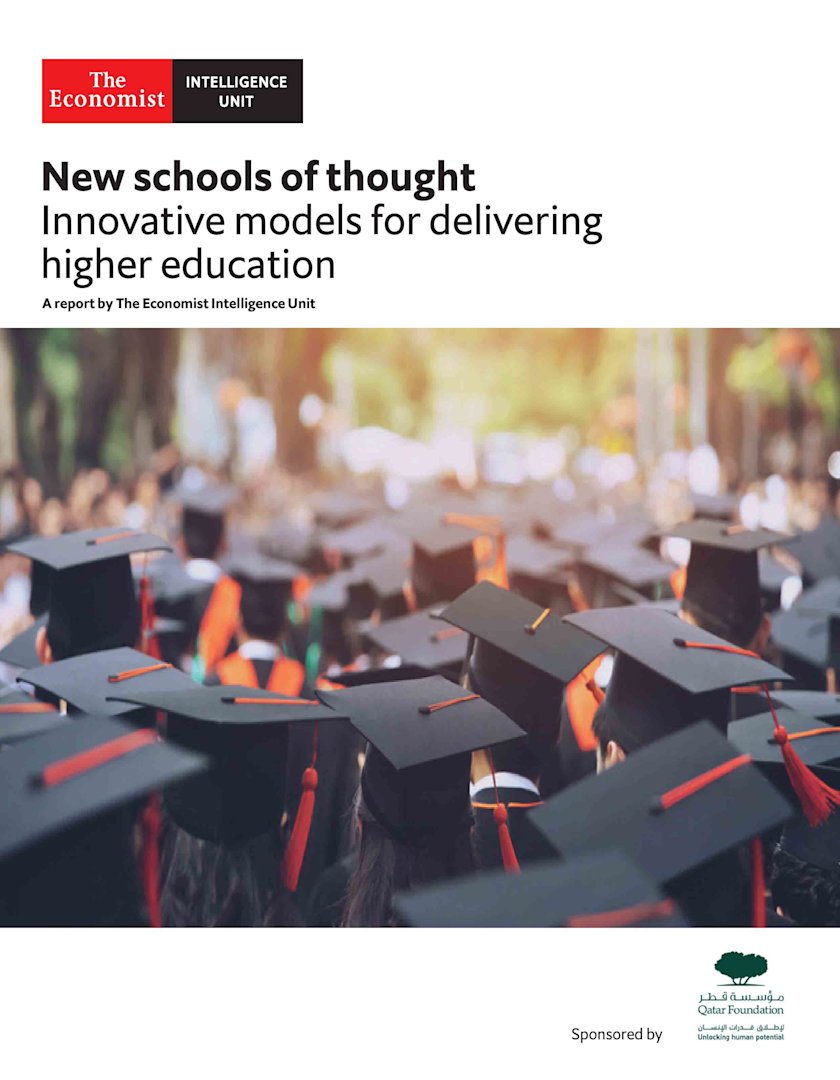
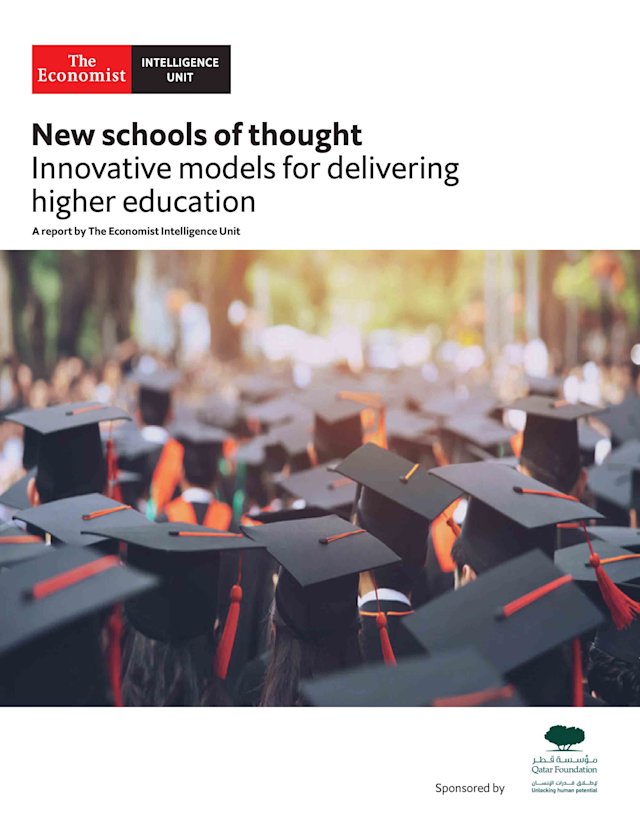
Learning from each other
As Qatar’s schools adapted to online learning and teaching, the Education Development Institute (EDI) – part of QF’s Pre-University Education (PUE) – launched a platform enabling the country’s teachers to work together digitally on improving student outcomes. The educator-led PU E-Learning Website encourages teacher-to-teacher learning, providing a digital space for sharing educational practices and resources, swapping ideas, and finding inspiration.
“Peer learning and collaboration are known to be strong professional learning strategies, and in QF alone we have many quality educators who can share their knowledge, experience, and best practices with other teachers,” said Vanessa Miller, Lead Trainer, EDI.
And leaders of progressive schools from five countries were brought together by QF to highlight how children and parents are shaping their own learning environments.
The PUE-hosted Leading Educational Advancement in Progressive Schools (LEAPS) webinar discussed the importance of child agency in classrooms, with Maryam Al-Hajri, Director of Academyati – QF’s progressive school – saying: “The most important things we’re trying to build are that independent learner personality; that creative problem-solver mindset.”
As Qatar’s schools adapted to online learning and teaching, the Education Development Institute (EDI) – part of QF’s Pre-University Education (PUE) – launched a platform enabling the country’s teachers to work together digitally on improving student outcomes. The educator-led PU E-Learning Website encourages teacher-to-teacher learning, providing a digital space for sharing educational practices and resources, swapping ideas, and finding inspiration.
“Peer learning and collaboration are known to be strong professional learning strategies, and in QF alone we have many quality educators who can share their knowledge, experience, and best practices with other teachers,” said Vanessa Miller, Lead Trainer, EDI.
And leaders of progressive schools from five countries were brought together by QF to highlight how children and parents are shaping their own learning environments.
The PUE-hosted Leading Educational Advancement in Progressive Schools (LEAPS) webinar discussed the importance of child agency in classrooms, with Maryam Al-Hajri, Director of Academyati – QF’s progressive school – saying: “The most important things we’re trying to build are that independent learner personality; that creative problem-solver mindset.”
QF’s Education Development Institute:
- Leads professional learning and development
- Supports curriculum improvement
- Builds leadership capacity
In QF alone we have many quality educators who can share their knowledge, experience, and best practices with other teachers
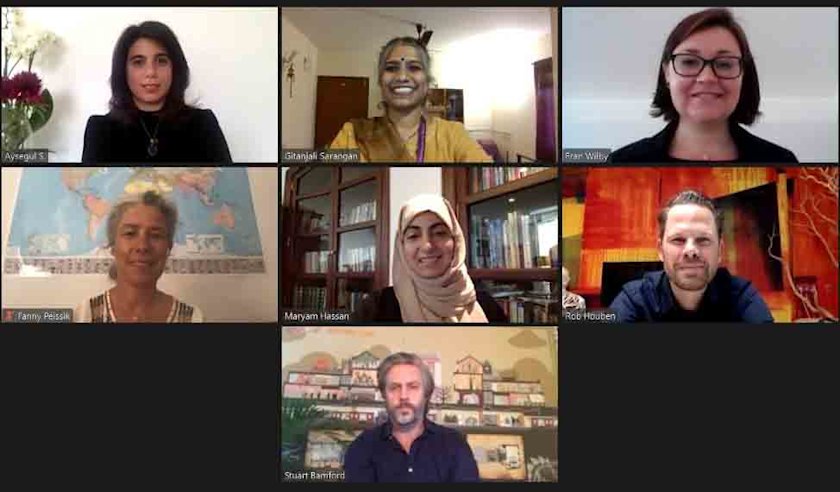
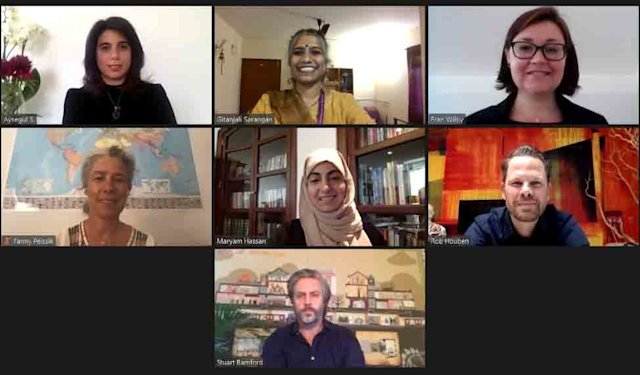
Leading on resilience
Support for Qatar’s efforts to combat COVID-19 continued to come from across QF in May, as VCUarts Qatar’s Fabrication Lab team worked with US fabricators and universities to produce laser-cut protective face shields, with the first batches being made for doctors and other healthcare workers. Meanwhile, Qatar Red Crescent Society was provided with 1,000 vital face shields to protect its volunteers, through the 3D printing and manufacturing facilities and expertise at QF partner university Texas A&M University at Qatar.
And research projects designed to help children with Autism learn from home, enforce quarantine measures, and safeguard the mental wellbeing of healthcare workers were among those to be supported through a new, streamlined funding avenue launched by QF member Qatar National Research Fund (QNRF): the Rapid Response Call.
“At a time when we are in the grip of a global pandemic, we decided to ramp up our efforts to assume research leadership not only in the region, but in the world,” said Dr. Abdul Sattar Al-Taie, Executive Director of QNRF.
Support for Qatar’s efforts to combat COVID-19 continued to come from across QF in May, as VCUarts Qatar’s Fabrication Lab team worked with US fabricators and universities to produce laser-cut protective face shields, with the first batches being made for doctors and other healthcare workers. Meanwhile, Qatar Red Crescent Society was provided with 1,000 vital face shields to protect its volunteers, through the 3D printing and manufacturing facilities and expertise at QF partner university Texas A&M University at Qatar.
And research projects designed to help children with Autism learn from home, enforce quarantine measures, and safeguard the mental wellbeing of healthcare workers were among those to be supported through a new, streamlined funding avenue launched by QF member Qatar National Research Fund (QNRF): the Rapid Response Call.
“At a time when we are in the grip of a global pandemic, we decided to ramp up our efforts to assume research leadership not only in the region, but in the world,” said Dr. Abdul Sattar Al-Taie, Executive Director of QNRF.
At a time when we are in the grip of a global pandemic, we decided to ramp up our efforts to assume research leadership not only in the region, but in the world
QNRF’s Rapid Response Call:
- Received 230 proposals
- Funded 21 projects
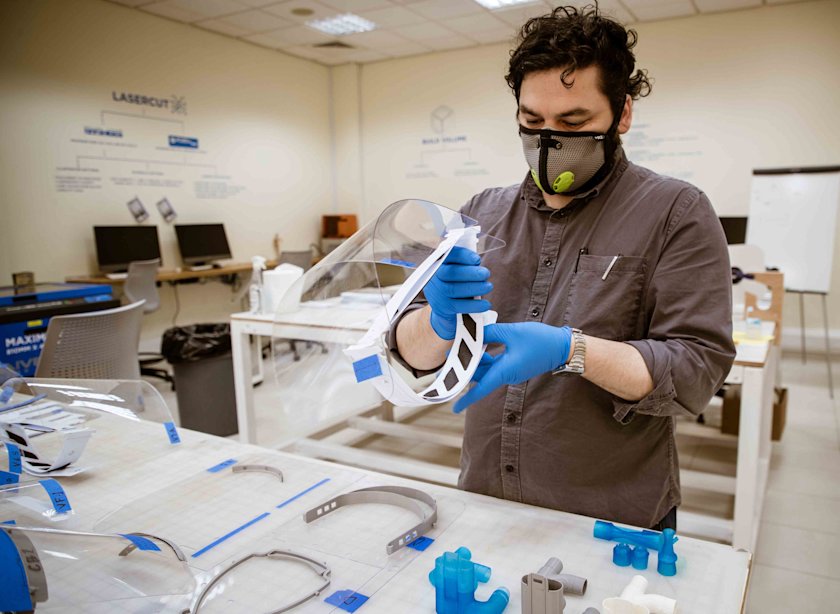
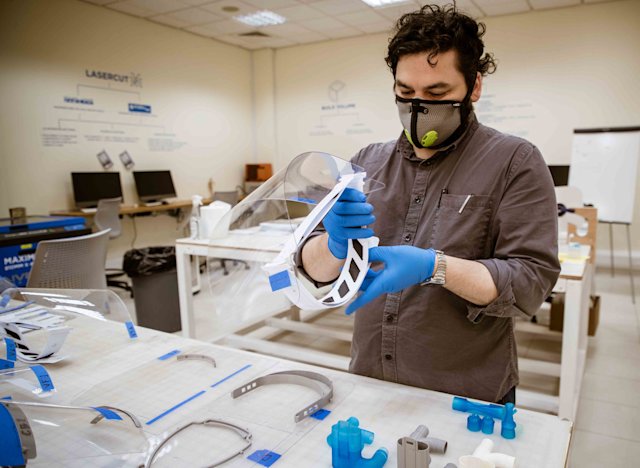
Why the mind matters
International experts warned that mental health provision around the world has been left at a “crossroads”, in the second online edition of QF’s Education City Speaker Series to be held since the pandemic began.
‘Global Perspectives: Mental Health In A COVID-19 World’, held in collaboration with the World Innovation Summit for Health – QF’s global health initiative – saw speakers from Qatar, the US, Europe, and Africa discuss the strain that the coronavirus crisis has placed on people’s mental wellbeing, and what needs to be done to protect their minds as well as their bodies.
“If there is greater pressure on health systems with regard to physical health issues, mental health can become more marginalized,” Paul Farmer, Chief Executive Officer of UK mental health charity Mind, told the webinar. “Leaving aside the psychological consequences of this crisis will store up financial and health consequences, potentially for years to come.”
International experts warned that mental health provision around the world has been left at a “crossroads”, in the second online edition of QF’s Education City Speaker Series to be held since the pandemic began.
‘Global Perspectives: Mental Health In A COVID-19 World’, held in collaboration with the World Innovation Summit for Health – QF’s global health initiative – saw speakers from Qatar, the US, Europe, and Africa discuss the strain that the coronavirus crisis has placed on people’s mental wellbeing, and what needs to be done to protect their minds as well as their bodies.
“If there is greater pressure on health systems with regard to physical health issues, mental health can become more marginalized,” Paul Farmer, Chief Executive Officer of UK mental health charity Mind, told the webinar. “Leaving aside the psychological consequences of this crisis will store up financial and health consequences, potentially for years to come.”
Leaving aside the psychological consequences of this crisis will store up financial and health consequences, potentially for years to come
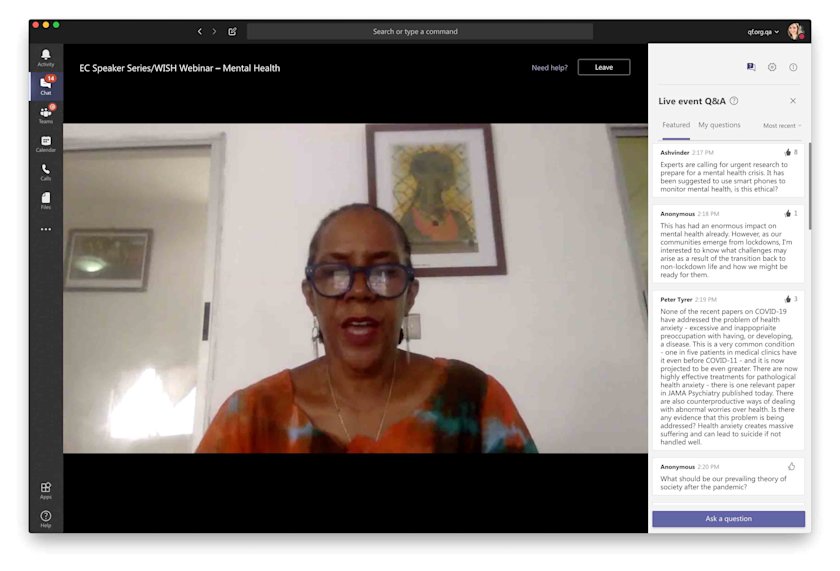
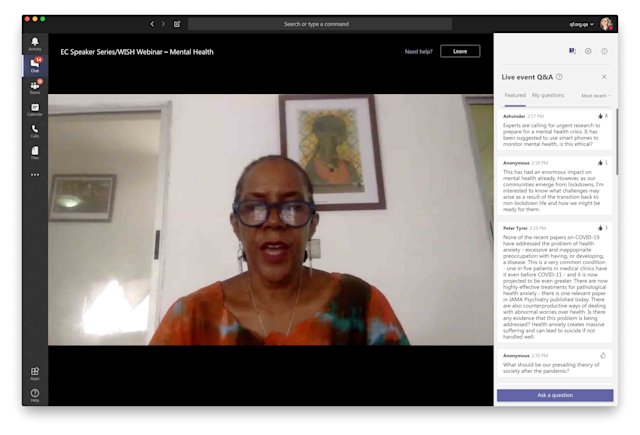
Sharing a cultural experience
The spirit of Ramadan was celebrated in virtual form by QF in May – through online events that provided people of all cultures with an online insight into its traditions, and an opportunity to come together despite COVID-19 restrictions.
Members of the community from Qatar and beyond joined sessions organized by QF’s Community Engagement team and cultural consultancy company Embrace Doha that explained the essence of Garangao – the mid-point of Ramadan – and the true meaning of Eid Al-Fitr.
And the Community Engagement team within QF also collaborated with youth initiative TOMOH For Development Organization to host an online gathering where social media influencers from Qatar invited fellow influencers from abroad – and the public - to experience a virtual iftar in a Qatari setting.
“These events reflect our belief that, even though we are physically apart, we can still come together to enjoy, learn, and share experiences,” said Ameera Al-Aji, Culture and Heritage Programming Specialist, QF.
The spirit of Ramadan was celebrated in virtual form by QF in May – through online events that provided people of all cultures with an online insight into its traditions, and an opportunity to come together despite COVID-19 restrictions.
Members of the community from Qatar and beyond joined sessions organized by QF’s Community Engagement team and cultural consultancy company Embrace Doha that explained the essence of Garangao – the mid-point of Ramadan – and the true meaning of Eid Al-Fitr.
And the Community Engagement team within QF also collaborated with youth initiative TOMOH For Development Organization to host an online gathering where social media influencers from Qatar invited fellow influencers from abroad – and the public - to experience a virtual iftar in a Qatari setting.
“These events reflect our belief that, even though we are physically apart, we can still come together to enjoy, learn, and share experiences,” said Ameera Al-Aji, Culture and Heritage Programming Specialist, QF.
These events reflect our belief that, even though we are physically apart, we can still come together to enjoy, learn, and share experiences
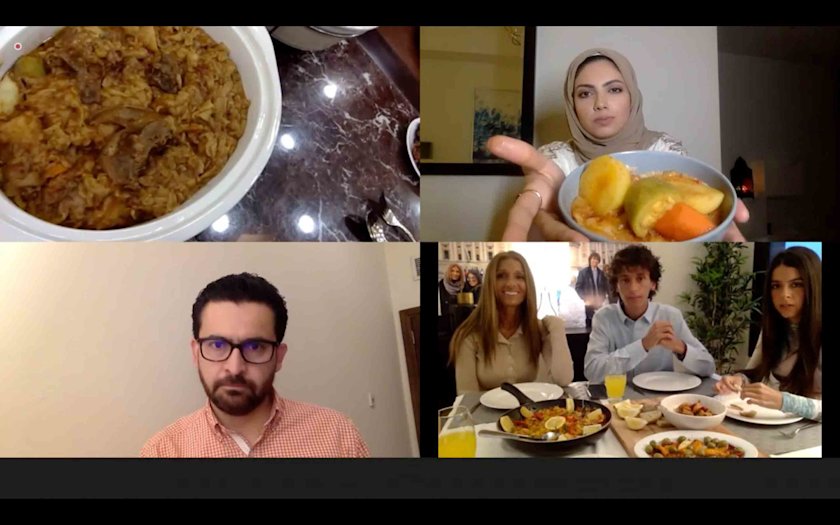
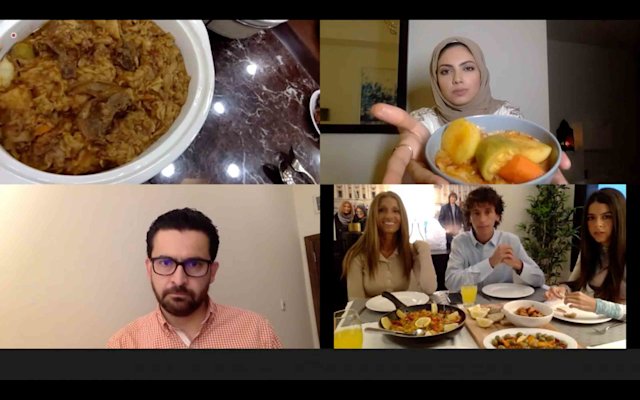
Strength through science
May also reinforced the international credibility and collaborative nature of QF’s research, development, and innovation ecosystem. A team at HBKU’s College of Science and Engineering were awarded a three-year grant from NATO’s Emerging Security Challenges Division, to propose lightweight security mechanisms specifically tailored for Internet of Things networks.
And HBKU’s Qatar Environment and Energy Research Institute teamed up with Australia’s Curtin University for a research alliance focusing on some of the most serious corrosion and material problems faced by both countries’ oil and gas industries.
Qatar’s environment means its engineering materials are at greater risk of corrosion, at a cost of millions of dollars, and Dr. Hanan Farhat, Senior Research Director at QEERI’s Corrosion Center, said: “Our research aims to investigate the root causes of corrosion and material failures, determine the factors that contribute to these failures – and provide solutions to eliminate them.”
May also reinforced the international credibility and collaborative nature of QF’s research, development, and innovation ecosystem. A team at HBKU’s College of Science and Engineering were awarded a three-year grant from NATO’s Emerging Security Challenges Division, to propose lightweight security mechanisms specifically tailored for Internet of Things networks.
And HBKU’s Qatar Environment and Energy Research Institute teamed up with Australia’s Curtin University for a research alliance focusing on some of the most serious corrosion and material problems faced by both countries’ oil and gas industries.
Qatar’s environment means its engineering materials are at greater risk of corrosion, at a cost of millions of dollars, and Dr. Hanan Farhat, Senior Research Director at QEERI’s Corrosion Center, said: “Our research aims to investigate the root causes of corrosion and material failures, determine the factors that contribute to these failures – and provide solutions to eliminate them.”
QEERI focuses on:
- Climate change and atmospheric science
- Solar photovoltaics
- Energy storage technologies
- Smart grids
- Water desalination
- Water quality and reuse
- Aquifer recharge
HBKU’s College of Science and Engineering offers 13 academic programs
